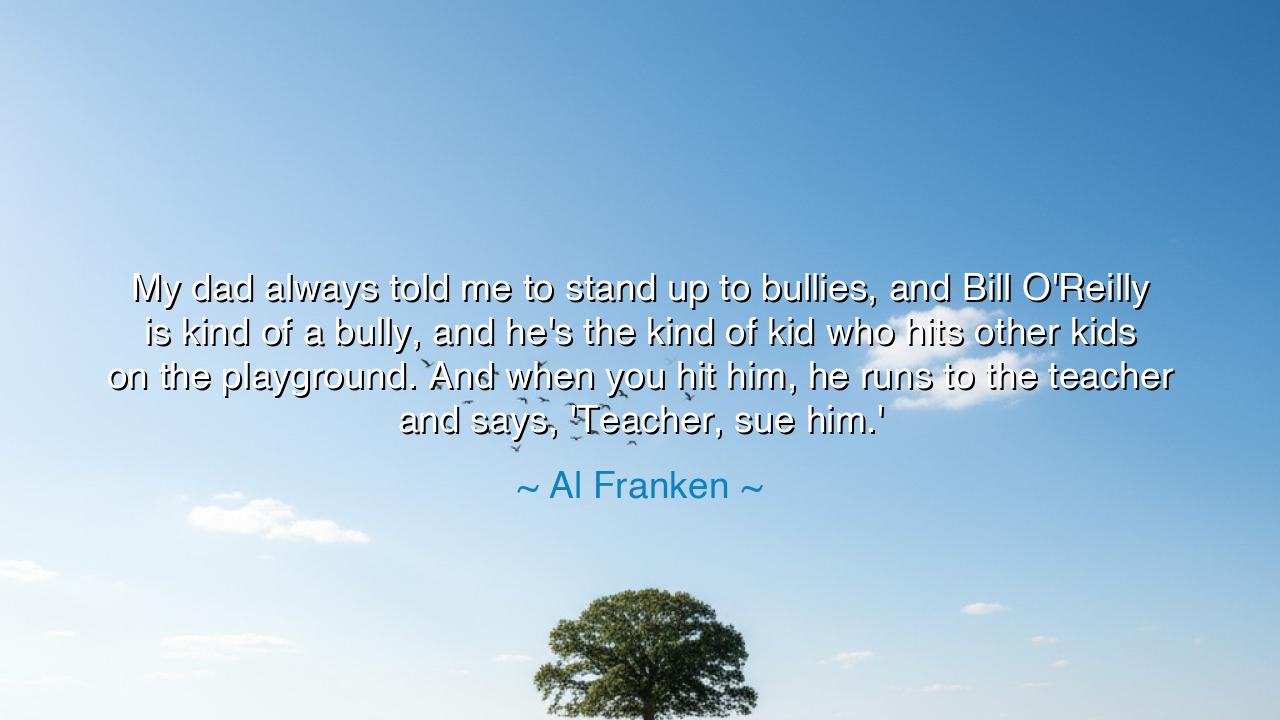
My dad always told me to stand up to bullies, and Bill O'Reilly
My dad always told me to stand up to bullies, and Bill O'Reilly is kind of a bully, and he's the kind of kid who hits other kids on the playground. And when you hit him, he runs to the teacher and says, 'Teacher, sue him.'






Al Franken once declared with sharpness and wit: “My dad always told me to stand up to bullies, and Bill O’Reilly is kind of a bully, and he’s the kind of kid who hits other kids on the playground. And when you hit him, he runs to the teacher and says, ‘Teacher, sue him.’” Though humorous in tone, these words contain the ancient wisdom of justice and courage: that the coward often disguises himself in the garments of the aggressor, and that one must learn not only to endure but to resist the oppressor with firmness of spirit.
To stand up to bullies is a lesson as old as civilization. For the bully, whether in the schoolyard or in the halls of power, thrives on fear and silence. He strikes not only with fists or words, but with the presumption that others will not resist. Franken’s father’s counsel was the counsel of the ages: do not bow to intimidation, but rise against it. Yet, in his portrait of O’Reilly as the child who strikes and then hides behind authority, Franken reveals another truth—that the bully is often not truly strong, but brittle, unable to endure when the tables are turned.
The ancients themselves spoke of such men. Aristotle taught that true courage lies in standing firm against both danger and injustice, while the tyrant cloaks his weakness with violence. In Roman times, the poet Juvenal mocked those who oppressed others with words and power, but crumbled when held to account. Franken’s comparison is no mere jest; it is a reminder that beneath the bluster of the bully often lies fear and fragility.
History gives us many such examples. Consider the rise of Joseph McCarthy, who in the 1950s wielded accusation like a weapon, striking fear into thousands. He seemed unstoppable, until one man, Joseph Welch, stood before him and spoke the immortal words: “Have you no sense of decency, sir, at long last?” In that moment, the bully was revealed as small, his cruelty unmasked, and his power crumbled. Just as on the playground, when the victim finally resists, the false strength of the aggressor dissolves.
There is also a heroic dimension here. To stand up is not only to resist harm for oneself, but to show others that resistance is possible. One act of defiance can awaken courage in many. When Rosa Parks refused to give up her bus seat, she did not merely confront a single bully of segregation; she ignited a movement that brought down a system of oppression. Her action proved Franken’s point: the bully may bark and threaten, but when faced with courage, he reveals his weakness, seeking refuge in laws and systems that, once exposed, cannot protect him.
The lesson for us is this: do not be deceived by the loudness of the bully’s voice or the force of his first blow. His strength is not true strength, but a bluff built on fear. If you yield, he grows stronger. If you resist, he falters. To stand up is to reclaim dignity, and in that act, you not only protect yourself but offer a shield to those around you who also suffer in silence.
Practical wisdom follows. Teach your children, as Franken’s father did, not to strike out in cruelty but to resist cruelty when it comes. In your workplace, in your community, when you see injustice, do not look away. Speak, act, and expose. And when the bully seeks to run to the “teacher” of power, demanding punishment for your resistance, know that his protest is itself the proof of his weakness.
Thus Franken’s words, though cloaked in humor, are a parable for all generations. “My dad always told me to stand up to bullies.” Let us carry this teaching as a shield. For the bully thrives on fear, but courage breaks his power. And when courage spreads from one to many, the playground becomes a place not of oppression, but of freedom and dignity, where all may stand upright without fear.






AAdministratorAdministrator
Welcome, honored guests. Please leave a comment, we will respond soon